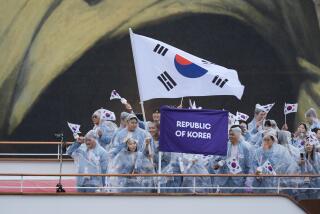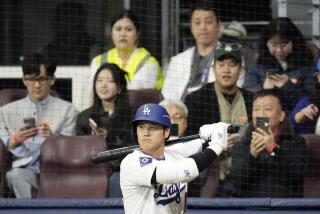After 10 Years, North Korean Soccer Team Emerges to Seek World Cup Spot
- Share via
TOKYO — North Korea’s national soccer team does not come out to play very often. After a 10-year hiatus from international games, the North Korean squad returned last year from self-imposed seclusion to chase a place in the 2006 World Cup, trailing its aura of mystery.
But North Korea’s road to the championship now goes through Japan, former colonizer of the Korean peninsula. Their national teams will meet Feb. 9 in a crucial qualifying game in Saitama, Japan, and the Japanese media and public have greeted the impending showdown with equal measures of fascination and jitters.
The game comes at a moment when the two countries are locked in a rancorous political dispute over at least eight Japanese citizens who were kidnapped by agents of the Communist state during the Cold War and are said to be dead.
Anti-North Korean emotions are running high in Japan over the abductees. A large majority of the Japanese public and media is clamoring for Tokyo to impose economic sanctions against North Korea for what are seen as unconvincing explanations of how the abductees died.
The pressure is building. On Thursday, Japan’s Foreign Ministry issued its sharpest warning yet, condemning North Korea for its “extremely unconstructive approach” and warning of “stringent measures” unless Pyongyang became more cooperative about the abductees.
Whether that official anger will spill onto the field or into the stands in Saitama -- where 5,000 ethnic North Koreans living in Japan have bought tickets and will struggle to make their voices heard over 55,000 Japanese fans -- is hard to gauge.
Japan is particularly sensitive in the wake of last summer’s Asia Cup tournament held in China, where a sizable number of Chinese fans jeered the Japanese team.
By holding up hostile signs and throwing debris at the Japanese, Chinese fans demonstrated that little is forgotten or forgiven from the years of Japanese war and occupation.
Having criticized the Chinese for not protecting Japanese fans, Japanese Prime Minister Junichiro Koizumi has tried to head off similar ugliness when the North Korean team visits Saitama.
“Football is not politics,” Koizumi told journalists this month. “I want the match to be enjoyed in a friendly atmosphere. I hope they will look for a good match as supporters who love soccer.”
Japan’s ultra-right-wing nationalists say they have no intention of disrupting the match.
“Sports is sports,” said a spokesperson for Issuikai, a right-wing group. “We are not planning any activities at all.”
So Chung On of the North Korean Assn. of Residents in Japan says he too believes the game will be played peacefully.
“A few people can influence the atmosphere of the soccer game, but those people should be restrained by other Japanese fans,” So said.
Japanese police are not so sure. Although refusing to discuss details of security arrangements, a spokesman for the Japan Football Assn. said the police presence would be significantly larger than that of last fall when 200 police and 1,050 private security guards watched over a game against visiting Singapore.
Anticipation of the North Korean game is already palpable. North Korean soccer officials have formally protested the crush of Japanese media outside their team’s training camp on the Chinese island of Hainan, where the squad has been practicing for a week.
Japanese photographers and TV crews have been climbing walls at the camp, trying to get a glimpse of the North Korean team in training. North Korean officials have demanded that the wall surrounding their practice field be raised, according to Chinese media. (The Chinese sports press, watching the Japanese and North Korean behavior with amusement, has referred to Japanese reporters as “spies.”)
The Japanese media seized on reports that the North Korean government was offering houses and luxury cars to its players if they won. Japan’s Kyodo News quoted Ri Hyon, a senior North Korean sports official, as saying: “We’ve given a huge amount of bonuses, the latest model of houses and high-class cars to the players according to their achievements.”
North Korea’s national team is made up almost entirely of players from the April 25 Korean People’s Army team. National team director Kim Jong Shik told the Chinese newspaper Sports World that “our players have a military spirit, our people have high expectations, and our team is obliged to win.”
If the players do, it would mark North Korea’s most dramatic victory since its legendary 1-0 upset of Italy at the 1966 World Cup played in England. Since then, North Korea has not returned to the tournament’s final stage.
The country has not played Japan since a 3-0 loss in 1993.
After failing to qualify for the 1994 World Cup played in the United States, the North Koreans withdrew from international competition for 10 years. Their absence until resurfacing last year for the preliminary stage of the World Cup qualifying rounds -- where they won their division without a loss -- has only increased their mysteriousness.
Among those with the most curiosity are two of the North Korean national team’s own players: Li Han Je and An Yon Hak. Ethnic North Koreans who live in Japan and play professional soccer in this country’s J-League, they were chosen to play for their national team in Saitama.
“North Koreans living in Japan, like me, are in a peculiar situation,” An told Japan’s Asahi newspaper last week. “North Korea is my home country.
“But it is a country I know nothing about.”
Hisako Ueno of The Times’ Tokyo Bureau contributed to this report.
More to Read
Go beyond the scoreboard
Get the latest on L.A.'s teams in the daily Sports Report newsletter.
You may occasionally receive promotional content from the Los Angeles Times.






